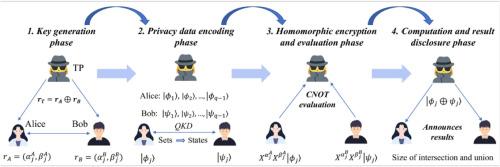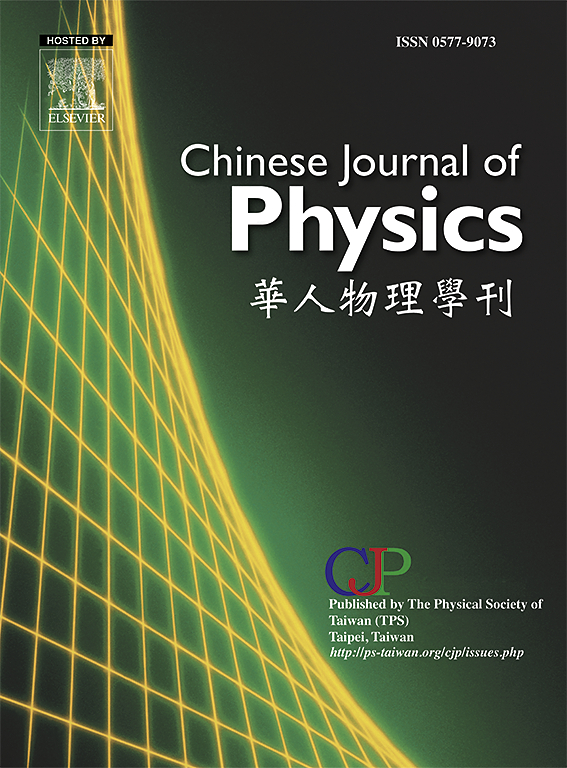Quantum scheme for private set intersection and union cardinality based on quantum homomorphic encryption
IF 4.6
2区 物理与天体物理
Q1 PHYSICS, MULTIDISCIPLINARY
引用次数: 0
Abstract
Private set intersection (PSI) and private set union (PSU) are the crucial primitives in secure multiparty computation protocols, enabling several participants to jointly compute the intersection and union of their private sets without revealing any additional information. Quantum homomorphic encryption (QHE) offers significant advantages in handling privacy-preserving computations. However, given the current limitations of quantum resources, developing efficient and feasible QHE-based protocols for PSI and PSU computations remains a critical challenge. In this work, a novel quantum private set intersection and union cardinality protocol is proposed, accompanied by the corresponding quantum circuits. Based on quantum homomorphic encryption, the protocol allows the intersection and union cardinality of users’ private sets to be computed on quantum-encrypted data with the assistance of a semi-honest third party. By operating on encrypted quantum states, it effectively mitigates the risk of original information leakage. Furthermore, the protocol requires only simple Pauli and CNOT operations, avoiding the use of complex quantum manipulations (e.g., gate and phase rotation gate). Compared to related protocols, this approach offers advantages in feasibility and privacy protection.

基于量子同态加密的私有集交集和并基数的量子方案
私有集交集(PSI)和私有集并集(PSU)是安全多方计算协议中的关键原语,使多个参与者能够在不泄露任何附加信息的情况下共同计算其私有集的交集和并集。量子同态加密(QHE)在处理隐私保护计算方面具有显著的优势。然而,鉴于目前量子资源的限制,为PSI和PSU计算开发高效可行的基于qhe的协议仍然是一个关键挑战。本文提出了一种新的量子私有集交并基数协议,并给出了相应的量子电路。该协议基于量子同态加密,允许在半诚实第三方的帮助下,在量子加密数据上计算用户私有集的交集和并集基数。通过对加密量子态进行操作,有效降低了原始信息泄露的风险。此外,该协议只需要简单的泡利和CNOT操作,避免使用复杂的量子操作(例如,T门和相位旋转门)。与相关协议相比,该方法在可行性和隐私保护方面具有优势。
本文章由计算机程序翻译,如有差异,请以英文原文为准。
求助全文
约1分钟内获得全文
求助全文
来源期刊

Chinese Journal of Physics
物理-物理:综合
CiteScore
8.50
自引率
10.00%
发文量
361
审稿时长
44 days
期刊介绍:
The Chinese Journal of Physics publishes important advances in various branches in physics, including statistical and biophysical physics, condensed matter physics, atomic/molecular physics, optics, particle physics and nuclear physics.
The editors welcome manuscripts on:
-General Physics: Statistical and Quantum Mechanics, etc.-
Gravitation and Astrophysics-
Elementary Particles and Fields-
Nuclear Physics-
Atomic, Molecular, and Optical Physics-
Quantum Information and Quantum Computation-
Fluid Dynamics, Nonlinear Dynamics, Chaos, and Complex Networks-
Plasma and Beam Physics-
Condensed Matter: Structure, etc.-
Condensed Matter: Electronic Properties, etc.-
Polymer, Soft Matter, Biological, and Interdisciplinary Physics.
CJP publishes regular research papers, feature articles and review papers.
 求助内容:
求助内容: 应助结果提醒方式:
应助结果提醒方式:


